Heartfelt Interview: Meron Residents Unable to Attend Lag B'Omer
With the holy site of Rabbi Shimon bar Yochai closed for the first time in years, Meron locals share their plans for celebrating Lag B'Omer amid severe restrictions.
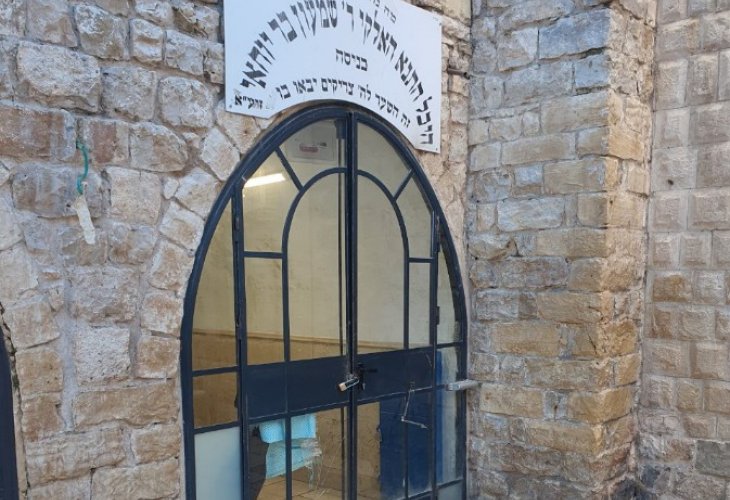 For the first time in years, the tomb of Rabbi Shimon bar Yochai is closed and locked (Photo: Meron Hospitality Committee)
For the first time in years, the tomb of Rabbi Shimon bar Yochai is closed and locked (Photo: Meron Hospitality Committee)As Israel's commerce and education systems strive to recover from historical upheaval, the grand celebration at Meron—held annually with the participation of hundreds of thousands of Jews—faces a pivotal moment. For Jews who haven't missed the pilgrimage to the sacred mountain in Meron on Lag B'Omer for decades, this presents an almost impossible hardship. Lag B'Omer without Meron? A Chalaka without Rabbi Shimon? Is this even conceivable? It's difficult to imagine Lag B'Omer without the mountain teeming with hundreds of thousands.
It appears that during the entire day of the celebration, only three kindlings will be allowed with limited attendance: one by the Boyaner Rebbe, who holds this tradition from his ancestors, the second for the Sephardic community, and the third for religious Zionism.
Due to the expected major changes at Meron, dozens of charitable associations that operate all year round at Meron, managing massive kitchens for producing thousands of food portions, find themselves shut down, particularly these days.
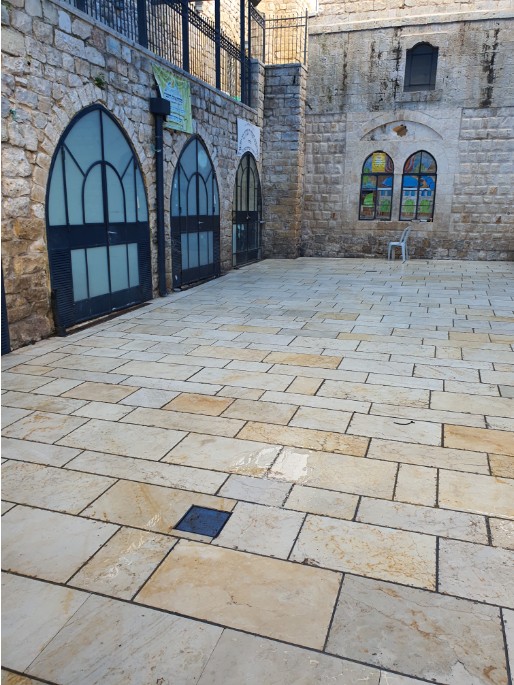 (Photo: Meron Hospitality Committee)
(Photo: Meron Hospitality Committee)If you are used to seeing images of preparations for the world's largest celebration, this year you will see the place devoid of people. No giant stands or sound equipment that usually rattled the mountain in regular years. This year, no "transportation collapse" will occur among the thousands of buses making their way to Meron. We won't witness the sight of hundreds of thousands dancing and singing "He will advocate well on our behalf, our master Bar Yochai" for the fiftieth time with full voice. This year, there will be no hullabaloo and deafening singing, and the cave will be deserted and desolate. As sad as it is painful.
With Meron desolate during the most unlikely time of the year, we went out to feel the emptiness and quiet ourselves and talk to the people of Meron, who breathe Meron all year round, and now will likely have to refrain from participating in the Lag B'Omer celebrations.
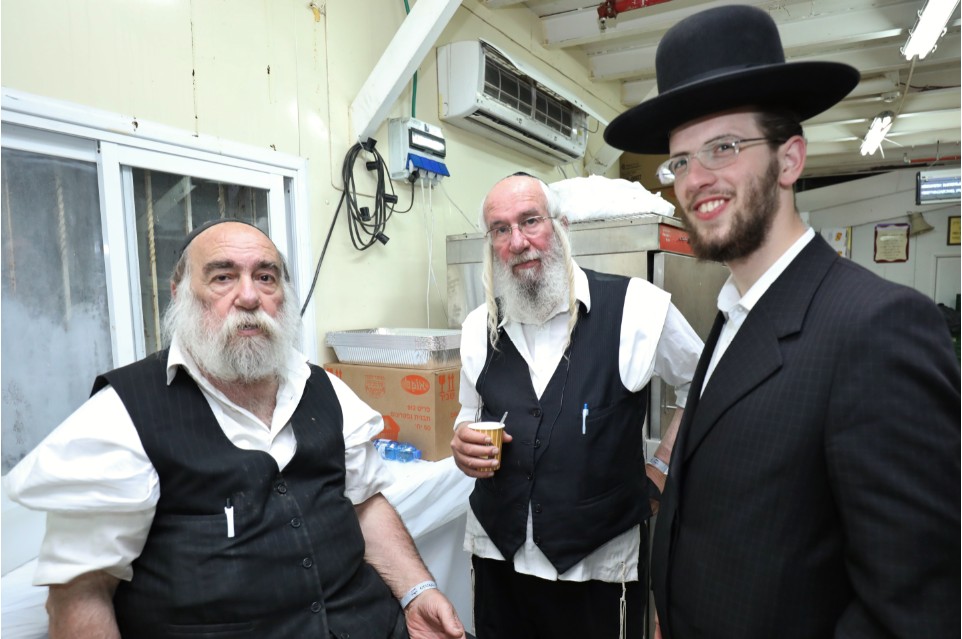 (Photo: Meron Hospitality Committee)
(Photo: Meron Hospitality Committee)
Charity Even in Times of Corona
The first place we chose to visit is Meron Hospitality. For those who do not know, it is important to note that you can always find a hot meal there, even if it's six in the morning or eleven at night. "Even in Corona times, we never stopped operating, and the ovens never took a day off," says Rabbi Yaakov Perlmutter, one of the owners of the hospitality service, who himself contracted Corona and was hospitalized at Laniado Hospital in Netanya. "With the closing of the site and the prohibition on visiting the tomb of Rabbi Shimon bar Yochai, we repurposed our kitchen's services to a 'kitchen for cooking food for Covid patients and isolated individuals without means' residing in Safed. Together with the Mayor of Safed, Mr. Shuki Ohana, we initiated the distribution project, and we cook nutritious and hot food, packaged aesthetically, and distributed to hundreds of isolated individuals in Safed and surrounding areas."
Rabbi Perlmutter has a partner in managing the extensive Meron operation, Rabbi Meir Carlebach, who in past years was one of the most persistent visitors to Meron. As such, he received a key to the kitchen of Meron Hospitality to satisfy his hunger whenever he wished. He peeked in, was impressed by the bustling and incessant activity, and joined. Today, he and Rabbi Perlmutter serve as managers of Meron Hospitality.
The kitchen's location holds great historical significance. Before it was established, a water well, erected by Sir Moses Montefiore to quench the thirst of Meron pilgrims, existed on site. Over time, the well ceased providing water, and the location lost its purpose. "Already decades ago, I started the hospitality project together with my friend Rabbi Yossi the Galilean, of blessed memory. We did it in an improvised and somewhat neglected manner. We set up tables and chairs and provided pots of food for the arriving pilgrims. With the outbreak of the cholera epidemic, authorities ruled that it could not continue, and in efforts to curb the spread of the disease, we received a proper place in the courtyard of Rabbi Shimon, where we remain to this day. We broke through the well structure and officially established Meron Hospitality."
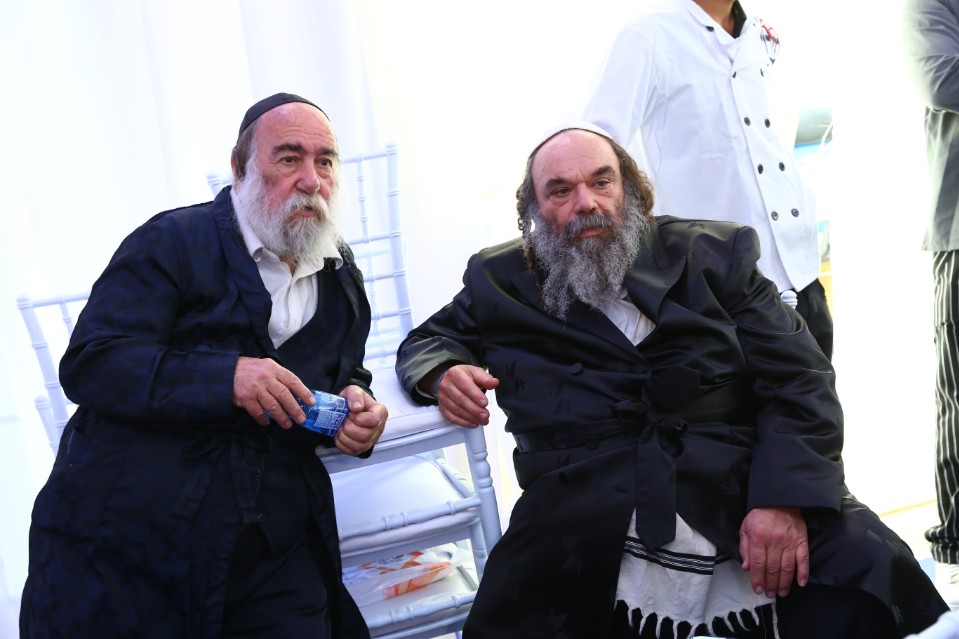 (Photo: Meron Hospitality Committee)
(Photo: Meron Hospitality Committee)"In regular years," Rabbi Perlmutter sighs, "we would cook 150,000 hot meals for the celebration attendees. The refreshments included a main dish and side dishes, in addition to the massive amount of sweet drinks."
And how do you feel knowing that this year you won’t be there to serve hot meals?
"I'm heartbroken," he says honestly, "The thought that after dozens of years without missing a single Lag B'Omer where I could serve hundreds of thousands at the pilgrimage, I will have to avoid it this year, chills me."
Still, there is a hint of hope woven into his words: "My entire prayer is that Rabbi Shimon bar Yochai will redeem us from this terrible pandemic, and we will be able to dance in the courtyard of the site this year. We are not trying to be clever; we are meticulously fulfilling the commandment of 'And you shall greatly heed your souls', strictly following the Ministry of Health's directives. If we can serve refreshments to those who will be allowed to arrive at the site, we will serve."
What do you see as the light at the end of the tunnel during these challenging times?
Rabbi Carlebach replies: "My greatest miracle is the fact that we continue to feed Jews even in this period. This is our great satisfaction, that the kitchen is not completely shut down and it continues to fulfill its purpose."
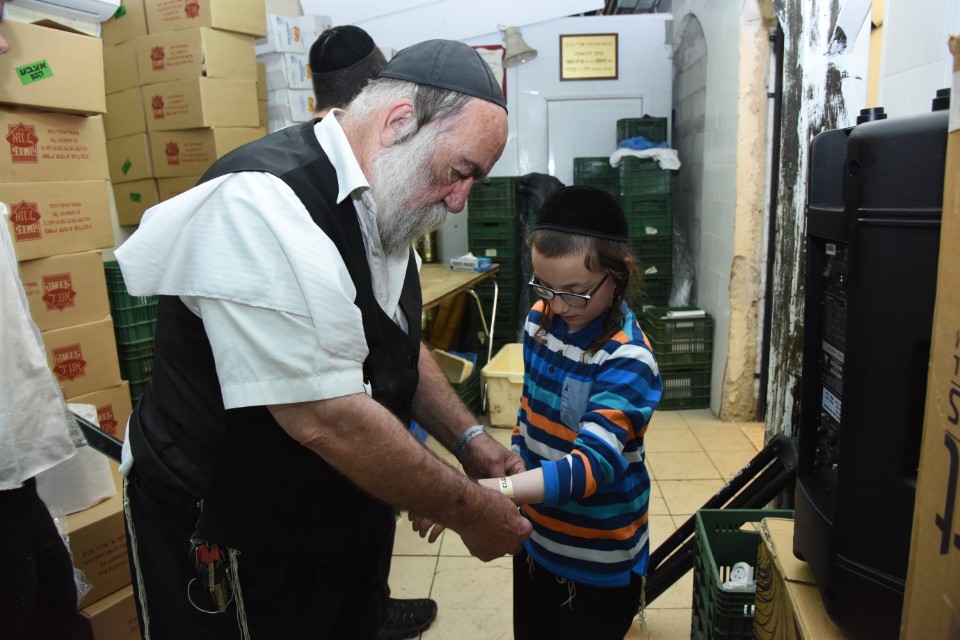 (Photo: Meron Hospitality Committee)
(Photo: Meron Hospitality Committee)
The Memories of Eliezer Moses
Former Knesset member Menachem Eliezer Moses (United Torah Judaism) is inextricably linked with Meron. "I have been active in Meron since 2007," he states. "For those who remember, in that year, there was a huge chaos, where people stood on the road for about eight hours. After the crisis, I took it upon myself to delve deeply and advocate for the pilgrims to Meron. With Hashem’s help, I succeeded in influencing the Minister of Tourism and other entities to make changes on the matter. Together with Yossi Schwenger and Israel Deri, responsible for holy sites, they have worked and continue to work tirelessly for Meron. Of course, the change didn’t happen overnight. After raising the issue repeatedly, Meron gained much improvement. It is not perfect yet, but far better than it was."
Moses takes us back to the more distant history: "My connection to Meron is profound and very long-standing. I have a picture of my father from 1934 when he arrived in Meron over eighty years ago with the students of Beit Yosef Tzvi Dushinsky Yeshiva. I cried tears when I found this picture.
"My emotional connection with Meron began with my Chalaka in 1953, which was, of course, in Meron. My father, of blessed memory, especially wrote down the account of this journey. Among other things, he noted: 'One had to take a bus at Chaim Attik, who owned a company with several trucks. We would load the heavy benches from the Karlin study house, serving as seats, where the backrest was virtually the back of the person sitting on the adjacent bench. Thus, we would set out to Merona. In the difficult and sharp turns approaching Meron, the driver had to descend and turn a special crankshaft, which prevented the fuel from the tank from spilling into the engine. Believe it or not, but before every turn, it was necessary to descend from the truck and turn the crankshaft, which was called 'mixing the fuel', so that the truck wouldn't stall.
‘We children enjoyed jumping off the truck each time to turn it. That was how we traveled in those days to Meron, on a journey that took about six-seven hours. Upon our arrival in Meron, we would descend with the elders of Karlin Chassidism who traveled with us, R' Sheya Heshel Altovsky and his son R' Aharon, R' Moshe Hoizman, R' Menachem Brizel, etc.
‘Upon our arrival at the site on the eve of Lag B'Omer, our eyes darkened; the place was full of kibbutzniks and members of HaShomer HaTzair, dancing and frolicking in the place with terrible amalgamation and recklessness. It pained us deeply to see this, but the Almighty helped, and suddenly, in the height of summer, the heaven’s gates opened, and it rained like hailstones from the sky. Drops the size of eggs dripped on the dancers, thunder, and lightning sounded, causing all the disreputable people to disperse, and the place remained in its purity.'"
Rabbi Moses continues his riveting tale of the year he celebrated Chalaka in Meron, "My mother recounts that that year torrents of rain fell, to the point where she feared the inn’s roof where they stayed might collapse. She wrapped me in a blanket and went out with me into the rain under the open sky.
"On the way back, I returned home with my mother, and my father followed, on a bus that mistakenly drove straight into Jenin's territories, where they were sure it was loaded with spies and led it directly to the Jordanian police station. In those days, the media didn’t check too much, and on the radio, it was reported that a bus full of worshippers had been taken captive. In Jerusalem, people were beside themselves, and R' Mendel Gafner, founder of the central Kohanim minyan at the Western Wall on Chol Hamoed, organized the public for prayers at the Yeshuot Yaakov Synagogue with terrible weeping. I still remember how women rushed into the synagogue and stormed the Ark with tears, reciting the 13 attributes of mercy. Finally, the Jordanians realized - after the UN’s weapons committee intervened - that these were not serious spies, thus concluding my long-Chalaka incident in Meron."
Moses cannot hide his longing and yearning for the holiday so dear to his heart, and he grants us another glimpse of old memories: "We had a Rebbe, the 'Imrei Chaim', who was deeply connected to Rabbi Shimon. Every morning after prayers, he would study the holy Zohar, and I, who had the privilege of serving him for about seven years, cannot forget how he longed for Meron all year round. Even when he lived abroad—before immigrating to Israel in 1935—he went and arrived in Meron especially from abroad to be there on Lag B'Omer. In 1939, he again arrived specifically for Lag B'Omer."
Do you remember another year like this, where there were so few participants in the Meron celebration?
Rabbi Moses recalls: "Before the Six-Day War, when the army did not allow travel to Meron and light a fire there, the Rebbe said during the third meal that although it’s impossible to kindle fire - Rabbi Shimon radiates fire in every Jewish heart. The next day, on the thirty-fourth day of the Omer, he decided to travel to Meron despite the opposition of those around him - since there is no proper shelter in Meron. However, the Rebbe insisted - 'Is there a better shelter than the cave of Rabbi Shimon bar Yochai?'
"Indeed, he traveled with his son, the author of 'Yeshuot Moshe'. Upon reaching Meron, he ascended the roof and lit the traditional bonfire. Just then, a group of soldiers arrived in place, who were on their way to the Syrian border. They joined the dancing and approached for a blessing. When the Rebbe left Meron, his face beamed, stating: "We have been saved.' As we set out on our way back to Safed, the news was broadcast on the radio that Jordan had also joined the war. 'If so', the Rebbe said, 'we will soon be able to go to the Western Wall as well.' And as he said - so it was. After the Six-Day War, the Western Wall was liberated."
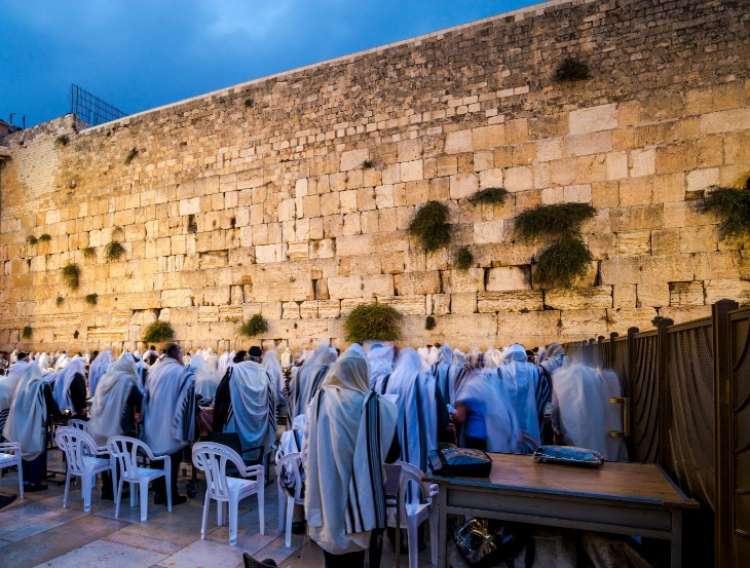 (Photo: shutterstock)
(Photo: shutterstock)
Lag B'Omer in the Shadow of Corona
Burdened by the rich past, we sought to update ourselves about the present. What is expected to happen this year at the tomb of Rabbi Shimon? To this end, we spoke with the "Chief of Staff of Lag B'Omer"—Rabbi Yosef Schwinger, CEO of the National Center for the Development of Holy Places, the body responsible for organizing the year’s biggest celebration event, and who in previous years prepared thousands of kilometers of roads, parking lots, terminals, signage, lighting, and water stations for the event. This year, things are going to look different. Completely different.
How will Meron look this year?
"Contrary to every year, this year, unfortunately, the mountain is supposed to be almost empty of people. No one among the thousands of celebrants will be able to ascend the mountain. The tomb itself will remain closed and locked, as it seems right now, although there may still be changes either way. Only three events will take place, all will occur at night. The Boyaner lighting will take place at eight. After that, in the same location, the Sephardic community lighting will occur at half-past ten, and at half-past eleven at night, there will be another lighting of the religious-Zionists."
How many people will be present during the lightings?
"Each lighting will consist of only forty people, similar to the Independence Day beacon lighting ceremony.
"We are preparing these days to operate a high-quality and professional live broadcast on our website," he adds, "even the strictest filters will allow access to this site. We will ensure that anyone who misses Meron will be able to participate at least virtually in some way. We are also launching a project for sending names for mention at the tomb of Rabbi Shimon. Our representatives will pray all day for those in need of salvation."
What do you have to say to those who will still want to come?
"The roads will be hermetically sealed. All roads, dirt paths, and side entrances will be blocked. One thing will be clear: access to the village area will not be possible at all."
Rabbi Schwinger sounds adamant, but he also seeks to explain: "We are deeply hurt by the situation we have found ourselves in. For me personally, as someone who has been working on Rabbi Shimon's celebration for over twenty years, it is particularly painful. But we have to understand that we are amid a pandemic. With daily infection rates continuing, we cannot gamble with people’s lives. We can't take a risk even on one individual. Nonetheless, we will do our utmost to bring live broadcasts and convey as much of the uplifting feeling as possible from the lightings in Meron to all regions of the country, hoping and praying for happier and easier days. With Heavenly assistance."

